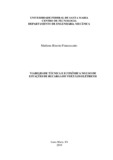| dc.contributor.advisor | Roos, Cristiano | |
| dc.creator | Francescatto, Matheus Binotto | |
| dc.date.accessioned | 2019-09-12T12:21:09Z | |
| dc.date.available | 2019-09-12T12:21:09Z | |
| dc.date.issued | 2019-07-16 | |
| dc.date.submitted | 2019-07-16 | |
| dc.identifier.uri | http://repositorio.ufsm.br/handle/1/18213 | |
| dc.description.abstract | With the increasing search for new technologic solution to reduce the damage to the environment caused by pollution, especially related to the automotive sector, the growth in sales of electric vehicles start appearing. However, it is necessary that the charging infrastructure of this type of automobiles also grow. Meaning that studies and researches are necessary in this area. Therefore, the objective of the present work is to perform a technical and economic feasibility analysis involving the use of different models of charging station for electric vehicles in the environment of the Federal University of Santa Maria. To fulfill this objective, ten different models of recharging stations classified according to their power in level 2 equipment and in fast charging equipment were analyzed. After that, 120 scenarios were defined involving the models, the tariffs of electric energy and the hour of operation of the parking lot approached. The Economic Engineering method used was the Equivalent Annual Uniform Cost (EAUC) and, in addition, the R$/kWh consumed value of each model was determined. The main results obtained were, for equipment classified as level 2, a maximum EAUC of R$ 184.399,35. For fast charging stations, the maximum EAUC found was R$ 687.864,51. Along with this, the maximum value of R$/kWh consumed obtained were 1,74 R$/kWh, and the minimum value was 0.73 R$/kWh. In conclusion, it was verified that the most viable models for the studied environment are the POWERCHARGE P30DPN and the CSI 60K750-EJA. | eng |
| dc.language | por | por |
| dc.publisher | Universidade Federal de Santa Maria | por |
| dc.rights | Acesso Aberto | por |
| dc.subject | Estações de recarga | por |
| dc.subject | Engenharia econômica | por |
| dc.subject | Veículos elétricos | por |
| dc.subject | Charginf stations | eng |
| dc.subject | Economic engineer | eng |
| dc.subject | Eletric vehicles | eng |
| dc.title | Viabilidade técnica e econômica no uso de estações de recarga de veículos elétricos | por |
| dc.title.alternative | Technical and economic feasibility in the use of electric vehicle charging stations | eng |
| dc.type | Trabalho de Conclusão de Curso de Graduação | por |
| dc.degree.local | Santa Maria, RS, Brasil | por |
| dc.degree.graduation | Engenharia Mecânica | por |
| dc.description.resumo | Com a crescente busca por novas soluções tecnológicas para reduzir as emissões danosas ao meio ambiente, especialmente relacionadas ao setor automobilístico, aparecem em crescimento às vendas de veículos elétricos. Entretanto, é necessário que a infraestrutura de recarga destes veículos também seja desenvolvida. Desta maneira, são necessários estudos e pesquisas na área. Mediante a isto, o objetivo do presente trabalho é realizar uma análise de viabilidade técnica e econômica envolvendo a utilização de diferentes modelos de estações de recargas para veículos elétricos no ambiente da Universidade Federal de Santa Maria. Para cumprir com este objetivo, foram analisados dez diferentes modelos de estações de recarga organizados conforme sua potência em equipamentos de nível 2, e em equipamentos de recarga rápida. Após, foram definidos 120 cenários envolvendo os modelos selecionados, as bandeiras tarifárias de energia elétrica vigentes e os horários de funcionamento do estacionamento abordado. O método de Engenharia Econômica utilizado foi o Custo Anual Uniforme Equivalente (CAUE) e, em adição, foi realizado a determinação do valor do R$/kWh consumido de cada modelo. Os principais resultados obtidos foram, para os equipamentos classificados como nível 2, um CAUE máximo de R$ 184.399,35. Para as estações de recarga rápida, o CAUE máximo encontrado foi R$ 687.864,51. Junto a isso, os valores máximo do R$/kWh consumido obtido foram de 1,74 R$/kWh, e o valor mínimo foi de 0,73 R$/kWh. Conclusivamente, verificou-se que os modelos mais viáveis para o ambiente estudado são o POWERCHARGE P30DPN e o CSI 60K750-EJA. | por |
| dc.publisher.country | Brasil | por |
| dc.publisher.initials | UFSM | por |
| dc.subject.cnpq | CNPQ::ENGENHARIAS::ENGENHARIA MECANICA | por |
| dc.publisher.unidade | Centro de Tecnologia | por |


